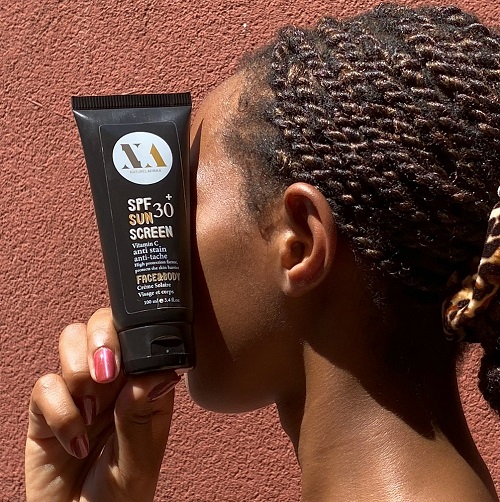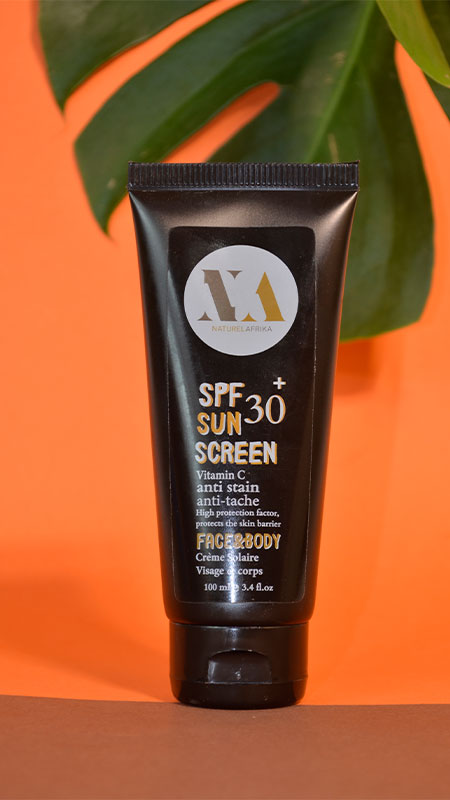-225x400h.jpg)

Sunscreen for Dark Skin: Why We Need Sunscreen with No White Cast
Experts advise us to use sunscreen everyday as the single most important step you can take to care for your skin to prevent dark spots, aging and hyperpigmentation. However, the belief that people with darker skin tones do not need sunscreen is a common false myth. People with darker skin tones are less likely to experience sunburn after prolonged sun exposure, and the common signs of aging, specifically wrinkles, take longer to appear in the darker range of skin tones. This leads many to think that darker skin is not damaged or aged by the sun. However, while darker skin is more resistant to sunburns than lighter skin, it still needs protection from long term sun damage that ages skin and leads to problems with hyperpigmentation.
One of the Best Products for Hyperpigmentation is Sunscreen
Hyperpigmentation is a common concern for people with melanated skin and using sunscreen every day helps prevent dark marks. In light skin, the sun causes damage that leads to burns, and premature aging, fine lines and wrinkles. For those of us with darker skin, it takes more intense sun exposure to cause a burn, but for black skin too, long term sun damage can result in aging that leads to hyperpigmentation, an uneven skin tone and wrinkles. While the short term results of sun expose range from burning to tanning based on your skin tone, people with darker skin still need to use sunscreen as part of their daily routine to prevent dark marks and hyperpigmentation, which is a long term result from sun exposure. If you want a lifelong beautiful and healthy skin you have to make sunscreen a daily routine just like you eat food or drink water.
And do not forget that in addition to beauty benefits, sunscreen is important for skin health. Since 1 in 40 women will get melanoma in their lifetime and Black people tend to be diagnosed at later stages and have worse outcomes with skin cancer, wearing sunscreen is an easy way to protect yourself.
Now let's consider what to look for when shopping for sunblock for dark skin.
A Good SPF for Dark Skin Starts with Broad Spectrum Protection
Naturel Afrika sunscreen products are with broad-spectrum coverage, which means it protects against both UVA and UVB light, two types of ultraviolet light that are always present, even when it’s cloudy and during the winter months, so it’s important to use sunscreen on a daily basis, no matter the weather or season.
UVA light is lower energy, but it penetrates into the deeper layers of the skin and causes long-term damage that leads to aging and skin discoloration. UVB light is higher energy and causes tanning and burning which is the short-term damage from excess exposure to the sun.
One of the major benefits of having darker skin is our natural sun protection is provided by a large amount of melanin, the pigment that gives skin its natural color. Melanin provides some burn protection from the harmful effects of UVB light, giving darker skin a natural SPF of 15. But that is not enough to protect you from the long-term damage and hyperpigmentation caused by UVA light, which is a common concern for people with dark tones. So, this is the reason you find both types of sun protection levels in Naturel Afrika products.
The Best Sunscreens for Melanin Skin with Both SPF and PA+ Protection Levels
Sun Protection Factor (SPF) is a measure of how well a sunscreen will protect your skin from UVB light. It’s important to note that sunscreens will not protect your skin against UVA light unless the product specifically mentions it provides broad spectrum protection, which protects against both types of ultraviolet light. If your goal were only to prevent sunburn, which is caused by UVB light, then knowing the SPF level is enough. However, if your goal is to prevent long term damage caused by UVA light, you need to know the PA grade, which is specific to UVA light protection.
When it comes to SPF levels for UVB protection, products can range from 15 to 100, but more is not always better. An SPF of 30 is not double the protection of SPF 15: SPF 15 blocks 93% of ultraviolet rays, while SPF 30 blocks 97%, and SPF 50 blocks 98%. So for daily use, an SPF of 30 is enough




Leave a Comment